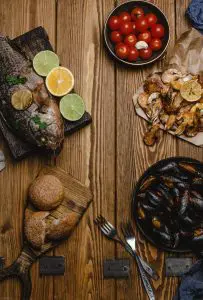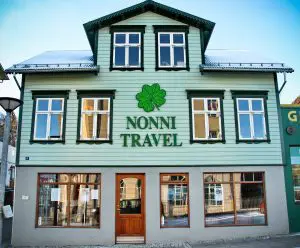Food & Culture Tours in the Faroe Islands
Available Food & Culture Tours
Learn More About Food & Culture Tours in the Faroe Islands
 Food and Culture Tours allow you to step into a world full of authentic Faroese cuisine and learn about the islands’ heritage from a local perspective. This is not just about eating. It is about understanding how traditions, stories, and flavors have shaped daily life on these windswept islands in the North Atlantic.
Food and Culture Tours allow you to step into a world full of authentic Faroese cuisine and learn about the islands’ heritage from a local perspective. This is not just about eating. It is about understanding how traditions, stories, and flavors have shaped daily life on these windswept islands in the North Atlantic.
Food has always played a central role in Faroese society. For generations, the people here have lived in close connection with the ocean and the harsh northern climate. Every meal carries the memory of resourcefulness, respect for nature, and the community spirit that defines island life.
On these tours, you will discover how this unique environment has created a food culture unlike anywhere else. Imagine tasting freshly caught fish prepared traditionally, savoring free-roaming lamb raised on wild mountain pastures, and enjoying seasonal herbs and berries gathered from the landscape. Each ingredient tells a story of survival and ingenuity.
Fermented and dried specialties, which might initially sound unusual, are part of everyday life and reveal much about the creativity of the Faroese people. These dishes are living traditions that reflect centuries of adaptation to a remote and challenging environment. By sampling them, you taste the history of the islands.
Local guides share much more than recipes. They invite you into the heart of Faroese traditions, introducing you to village life, folklore, and the strong community ties that still shape the culture today. You will see how ancient preservation methods meet modern culinary innovation, creating a vibrant food scene that is gaining recognition beyond the islands. Whether it is a home-cooked meal in a cozy village or a refined interpretation of local flavors, every moment connects you with the story of the Faroese people.
These tours are designed for travelers seeking more than sightseeing. Walking through traditional settlements, meeting local families, and sharing meals in authentic settings allows you to experience the Faroe Islands in a warm, personal, and memorable way.
Our Atlantic Neighbors: Travel Stories, Folklore & Hidden Gems in the Faroe Islands
Discover the Faroe Islands by Car: A Local’s Guide to Self-Drive Tours
How We Will Create Your Lifetime Journey: Best Self-Drive Tours in Iceland and the Faroe Islands
Velkomin!
Why Coolcations Are the Future of Travel: Iceland, the Faroe Islands, and Greenland Should Top Your List!
Most Common Questions About Food & Culture Tours in the Faroe Islands
What can I expect from a Food and Culture Tour in the Faroe Islands?
You can expect a mix of local food tastings, cultural experiences, and personal stories from Faroese guides. The tours combine authentic dishes with insights into village life, traditions, and the islands’ history.
What types of Faroese food will I taste on these tours?
Typical tastings include freshly caught fish, free-roaming lamb, fermented and dried specialties, and seasonal products such as seaweed, rhubarb, and wild berries. Some tours also include modern interpretations of traditional recipes.
Are Food and Culture Tours suitable for all travelers?
Yes, these tours are designed for travelers of all ages curious about Faroese cuisine and culture. Families, solo travelers, and small groups are all welcome.
Do I need to be adventurous with food to enjoy the tour?
Not at all. While some dishes, such as fermented fish, may be new to you, guides always explain the history and meaning behind the food. You can also enjoy milder flavors like lamb stew, fresh bread, and local cheeses.
How long does a typical Food and Culture Tour last?
Most tours last between three and five hours. Some are shorter walking tours with tastings, while others include half-day or full-day experiences with village visits and sit-down meals.
Are vegetarian or vegan options available on the tours?
Vegetarian options are available on request, although the traditional Faroese diet is heavily based on fish and lamb. Vegan alternatives may be limited due to local food traditions, but guides will do their best to accommodate.
Do the tours include cultural activities besides food?
Yes. Many tours include village walks, storytelling, visits to historical sites, and conversations with locals. Food is combined with cultural immersion to give you a complete Faroese experience.
Where do Food and Culture Tours usually take place?
Tours often occur in Tórshavn, the capital, and in smaller villages across the islands. Some experiences bring you directly into family homes or community gathering spaces.
How much do Food and Culture Tours in the Faroe Islands cost?
Prices vary depending on length and inclusions. Short tasting tours may start at around 600 to 800 DKK, while half-day or full-day cultural experiences can cost more.
Do I need to book in advance?
Advance booking is highly recommended, especially in summer when visitor numbers are higher. Tours often have small group sizes and can sell out quickly.
Are Food and Culture Tours guided by locals?
All tours are led by Faroese guides sharing their knowledge, personal stories, and family traditions. This local perspective makes the tours authentic and unique.
Can I combine a Food and Culture Tour with nature activities?
Some operators offer combined experiences, such as hiking followed by a traditional meal, or a boat trip ending with a food tasting. These combinations are a great way to enjoy both the landscape and the culture.
What makes Faroese food culture different from other Nordic countries?
Isolation, strong winds, and the ocean deeply shape Faroese cuisine. Drying, fermenting, and preserving are central techniques, giving the food unique flavors that reflect the islands’ environment and history.
Why should I join a Food and Culture Tour in the Faroe Islands?
By joining a tour, you gain more than just a meal. You connect with the Faroese way of life, learn about traditions that have survived for centuries, and enjoy dishes that carry both flavor and history.




